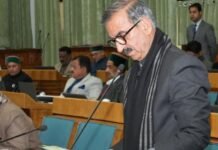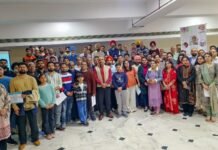Punjab –In a significant organizational overhaul, the Aam Aadmi Party (AAP) has announced a comprehensive expansion of its Punjab unit, signaling a proactive and meticulously planned strategy aimed at strengthening its grassroots presence and preparing for the upcoming 2027 assembly elections. This restructuring, reportedly influenced by former Delhi Deputy Chief Minister and AAP’s Punjab affairs in-charge Manish Sisodia, involves the appointment of numerous key functionaries across various levels of the party apparatus.
The revamped structure includes the appointment of five state vice presidents, nine general secretaries, and secretaries for all 13 Lok Sabha constituencies. Additionally, 27 leaders have been entrusted with responsibilities across 23 districts of the state, indicating a concerted effort to decentralize and empower local leadership. Notably, major urban centers like Jalandhar, Ludhiana, Amritsar, and Patiala have been strategically divided into two parts for more focused organizational management. Among the newly appointed state vice presidents are prominent MLAs such as Manjinder Singh Lalpura (Majha region), Dr. Sukhwinder Sukhi (Doaba region), Dr. Amandeep Kaur (Malwa Central), Dr. Charanjit Singh (Malwa East), and Jagdeep Singh Kaka Brar (Malwa West). Other significant appointments include Malvinder Singh Kang, Harchand Singh Barsat, Deepak Bali, and Sunny Singh Ahluwalia as state general secretaries, along with various state secretaries for different regions.
A party spokesperson articulated that these appointments are far beyond a mere “reshuffle”; they represent a “resolution” to permeate “organised thinking and honest politics” into every village, every youth, and every family across Punjab. This vision, strongly endorsed by AAP convenor Arvind Kejriwal and Chief Minister Bhagwant Mann, aims to transform every member of the new team into a “responsible officer” and a “bridge” between the government and the public, fostering accountability and trust. The party is positioning itself not just for the immediate electoral challenges but for a long-term vision, with Sisodia reportedly stating that the party is “not preparing for 2027; we are preparing for 2040.” This ambitious outlook frames AAP as a “people’s movement” rather than just a political party, emphasizing its commitment to sustained grassroots engagement and governance.
The timing of this expansion is strategically significant, coming shortly after the party’s performance in the recent Lok Sabha elections, which served as a wake-up call for the AAP in Punjab. The new organizational setup is seen as a direct response to the insights gleaned from extensive field surveys, public feedback, party workers’ inputs, and district and assembly constituency analyses conducted under Sisodia’s guidance. The move aims to correct any deficiencies in communication and implementation, ensuring that the party’s policies and achievements reach the furthest corners of the state effectively. By empowering more local leaders and creating a more robust organizational hierarchy, AAP seeks to address the criticism of a perceived centralized control from Delhi and strengthen the Bhagwant Mann-led government’s autonomy and effectiveness.
Furthermore, this organizational rejig is a crucial component of AAP’s “Mission 2027” – a concerted campaign to secure a second term in the Punjab Assembly elections. The party aims to learn from its past experiences and intensify efforts to fulfill its pre-poll promises, particularly the widely discussed commitment of providing ₹1,000 per month to women. While initiatives like 600 units of free electricity and significant job provisions have been implemented, the party faces mounting pressure to deliver on all its pledges. The expansion of the unit is intended to create a more agile and responsive political machinery capable of navigating the complex political landscape of Punjab, counteracting opposition narratives, and maintaining strong public support.
The new appointees are expected to act as vital conduits, bringing public concerns and feedback directly to the leadership, while also disseminating the government’s developmental agenda and policy successes to the masses. This dual role is critical for building public confidence and ensuring that the government remains attuned to the needs and aspirations of the common people. By engaging a broader base of party workers and leaders, AAP hopes to infuse renewed energy and commitment into its cadre, fostering a sense of ownership and collective responsibility for the party’s vision. The expansion is a clear indication that AAP is not resting on its laurels but is actively working to consolidate its position and deepen its roots in Punjab, transforming its political presence into a formidable and enduring force.
#AAPExpansion #PunjabPolitics #Mission2027 #OrganizationalRestructuring #ManishSisodia #BhagwantMann #GrassrootsPolitics #AAPPunjabUnit #PoliticalStrategy #PunjabElections





